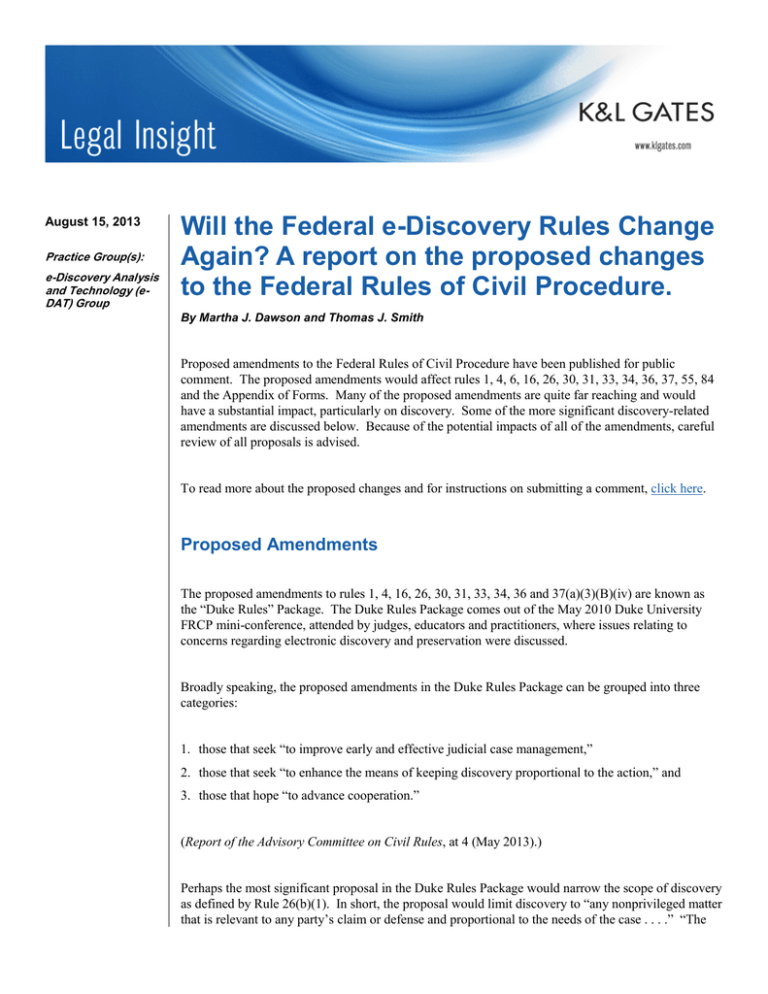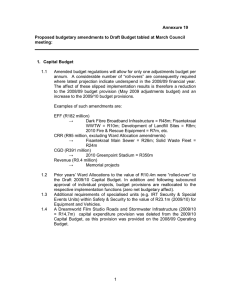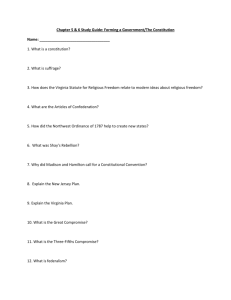
August 15, 2013
Practice Group(s):
e-Discovery Analysis
and Technology (eDAT) Group
Will the Federal e-Discovery Rules Change
Again? A report on the proposed changes
to the Federal Rules of Civil Procedure.
By Martha J. Dawson and Thomas J. Smith
Proposed amendments to the Federal Rules of Civil Procedure have been published for public
comment. The proposed amendments would affect rules 1, 4, 6, 16, 26, 30, 31, 33, 34, 36, 37, 55, 84
and the Appendix of Forms. Many of the proposed amendments are quite far reaching and would
have a substantial impact, particularly on discovery. Some of the more significant discovery-related
amendments are discussed below. Because of the potential impacts of all of the amendments, careful
review of all proposals is advised.
To read more about the proposed changes and for instructions on submitting a comment, click here.
Proposed Amendments
The proposed amendments to rules 1, 4, 16, 26, 30, 31, 33, 34, 36 and 37(a)(3)(B)(iv) are known as
the “Duke Rules” Package. The Duke Rules Package comes out of the May 2010 Duke University
FRCP mini-conference, attended by judges, educators and practitioners, where issues relating to
concerns regarding electronic discovery and preservation were discussed.
Broadly speaking, the proposed amendments in the Duke Rules Package can be grouped into three
categories:
1. those that seek “to improve early and effective judicial case management,”
2. those that seek “to enhance the means of keeping discovery proportional to the action,” and
3. those that hope “to advance cooperation.”
(Report of the Advisory Committee on Civil Rules, at 4 (May 2013).)
Perhaps the most significant proposal in the Duke Rules Package would narrow the scope of discovery
as defined by Rule 26(b)(1). In short, the proposal would limit discovery to “any nonprivileged matter
that is relevant to any party’s claim or defense and proportional to the needs of the case . . . .” “The
Will the Federal e-Discovery Rules Change Again? A report
on the proposed changes to the Federal Rules of Civil
Procedure.
proposed amendment deletes the ‘subject matter involved in the action’ from the scope of discovery.”
(Id. at 11.) Additionally, to better reinforce the need for proportionality, those considerations
currently identified in Rule 26(b)(2)(C)(iii) would be moved to Rule 26(b)(1). The proposal would
also delete the phrase “[r]elevant information need not be admissible at the trial if the discovery
appears reasonably calculated to lead to the discovery of admissible evidence” and would state instead
that “[i]nformation within this scope of discovery need not be admissible in evidence to be
discoverable.” Simply stated, the effects of the proposed amendments would be to reduce the volume
of information subject to discovery—a growing concern in light of the ever-increasing amount of data
created in this modern technological age—and to better ensure proportionality, a long-established but
heretofore under-recognized principle of modern civil discovery.
The Duke Rules Package also proposes to set or amend numeric limits in several discovery categories,
including reducing the presumptive limitations on the allowed number and length of depositions,
reducing the presumptive number of interrogatories to 15 and, for the first time, imposing a
presumptive limit on the number of Rule 36 requests to admit (25).
A major rewrite of Rule 37(e) is also proposed. In the wake of the 2006 amendments addressing the
discovery of electronically stored information, concern regarding the cost and burden of preservation
and the potential imposition of sanctions for a failure to preserve has become a major issue. Thus,
“[t]he fundamental thrust of the proposal is . . . to amend the rule to address the overbroad
preservation many litigants and potential litigants felt they had to undertake to ensure they would not
later face sanctions.” (Id. at 35.)
The proposed amendment focuses on sanctions rather than attempting directly to regulate the
details of preservation. But it provides guidance for a court by recognizing that a party that
adopts reasonable and proportionate preservation measures should not be subject to sanctions.
In addition, the amendment provides a uniform national standard for culpability findings to
support imposition of sanctions. Except in exceptional cases in which a party’s actions
irreparably deprive another party of any meaningful opportunity to present or defend
against the claims in the litigation, sanctions may be imposed only on a finding that the
party acted willfully or in bad faith. So the amendment rejects the view adopted in some
cases . . . that would permit sanctions for negligence.
(Id. (emphasis added).)
The proposed amendments to Rule 37(e) would also “describe factors to be considered both in
determining whether information should have been preserved and also in determining whether a
failure was willful or in bad faith.” (Id. at 2.) The proposed amendments to Rule 37(e) are substantial
and, to a degree, novel (in that they directly address parties’ preservation obligations), particularly in
light of the importance of preservation in the discovery process. Careful attention to this proposed
amendment is therefore warranted.
2
Will the Federal e-Discovery Rules Change Again? A report
on the proposed changes to the Federal Rules of Civil
Procedure.
Next Steps
The comment period will remain open for 6 months, closing on February 15, 2014. The comment
period will also include three hearings: November 7, 2013 in Washington, D.C.; January 9, 2014 in
Phoenix, AZ; and February 7, 2014 in Dallas, TX.
Following the public comment period, the Advisory Committee on Civil Rules will re-examine the
proposed amendments in light of public comment and then submit its final proposals (which may
include revisions to the proposed amendments) to the Committee on Rules of Practice and Procedure
for approval. If approved by the Committee on Rules of Practice and Procedure, the proposed
amendments will be sent to the Judicial Conference for approval and then (if approved), to the
Supreme Court. If the rules are approved by the Supreme Court, Congress will have six months to
reject, modify, or defer the proposed rules. Absent such Congressional action, the amendments will
go into effect in December 2015.
If you are interested in commenting on the proposed amendments or would like to hear more about
K&L Gates’ involvement in the process so far, please contact Martha Dawson, co-chair of K&L
Gates’ e-Discovery Analysis and Technology Group. Also, check out our Electronic Discovery Law
blog, ediscoverylaw.com for updates on this topic and others.
Authors:
Martha J. Dawson
martha.dawson@klgates.com
+1.206.370.7980
Thomas J. Smith
thomas.smith@klgates.com
+1.412.355.6758
Anchorage Austin Beijing Berlin Boston Brisbane Brussels Charleston Charlotte Chicago Dallas Doha Dubai Fort Worth Frankfurt
Harrisburg Hong Kong Houston London Los Angeles Melbourne Miami Milan Moscow Newark New York Orange County Palo Alto Paris
Perth Pittsburgh Portland Raleigh Research Triangle Park San Diego San Francisco São Paulo Seattle Seoul Shanghai Singapore Spokane
Sydney Taipei Tokyo Warsaw Washington, D.C. Wilmington
K&L Gates practices out of 48 fully integrated offices located in the United States, Asia, Australia, Europe, the
Middle East and South America and represents leading global corporations, growth and middle-market companies,
capital markets participants and entrepreneurs in every major industry group as well as public sector entities,
educational institutions, philanthropic organizations and individuals. For more information about K&L Gates or its
locations, practices and registrations, visit www.klgates.com.
3
Will the Federal e-Discovery Rules Change Again? A report
on the proposed changes to the Federal Rules of Civil
Procedure.
This publication is for informational purposes and does not contain or convey legal advice. The information herein should not be used or relied upon in
regard to any particular facts or circumstances without first consulting a lawyer.
©2013 K&L Gates LLP. All Rights Reserved.
4


